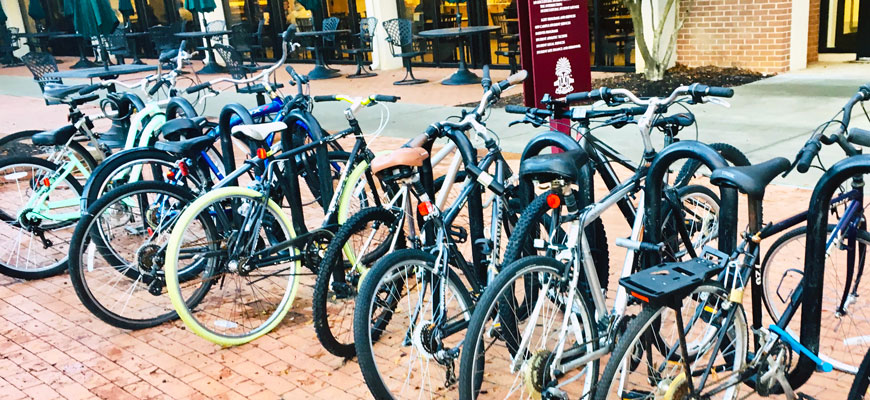
Campus improvements promote better biking experience
Plans include new racks, bike lane on South Main
Posted on: August 13, 2020; Updated on: August 13, 2020
By Chris Horn, chorn@sc.edu, 803-777-3687
Getting around on campus by bus and bicycle — or both — will be easier this academic year, thanks to ongoing campus infrastructure and transportation improvements and a planned reconfiguration of a portion of South Main Street.
New parking racks, jointly purchased by the university’s housing and facilities departments, will add about 350 bike spaces this year, making it easier for bicyclists to find a place to park. Most of the campus’ new fleet of larger buses will include front-mounted bike racks, enabling riders to transport their bikes with them across campus.
“We see this as a way to extend parking. Instead of driving from one part of campus to another, students can park on the perimeter and ride their bikes or ride the buses and carry their bikes along to avoid busy traffic and big hills,” says the university's chief operating officer, Jeff Perkins.
A state Department of Transportation project set to begin in early 2021 will narrow South Main Street from four lanes to two, starting at Pendleton and extending south to Blossom. That will create space for a dedicated bicycle lane separated from automobile traffic by a median. The campus already has dedicated bike lanes designated by painted stripes on Greene and Wheat streets.
The university will help maintain the landscaping associated with the South Main project, which is expected to spur new private development along the corridor, says Emily Jones, the university’s landscape architect. She adds that there are future plans to place self-serve bike repair stations with basic repair tools and air pumps around campus to support the campus’ biking community.
Instead of driving from one part of campus to another, students can park on the perimeter and ride their bikes or ride the buses and carry their bikes along to avoid busy traffic and big hills.
Jeff Perkins, chief operating officer
Candice Morgan, a College of Social Work faculty member, is a board member of the nonprofit Bike Collective and an avid bicyclist. She says the campus’ new bike racks are a significant upgrade and “the self-service bike repair stations will give more visibility to the bicycling culture on campus.”
Luzviminda Gruner, a Russell House copy shop staff member, commutes to campus daily on her bike and welcomes the new racks and other planned improvements. As the campus biking culture expands, she says there is a need for cyclist education on biking etiquette, such as obeying traffic signs and other rules of the road that less-experienced bicyclists sometimes ignore.
The campus biking culture could get a boost from Sophia Storlazzi, a rising senior in in the Arnold School of Public Health, who is promoting a plan to repair abandoned bikes on campus and make them available to the campus community. As the chief sustainability officer for the Residence Hall Association, Storlazzi advocated for removal of abandoned bikes that were taking up space on racks.
“Then I thought we should do more than just remove them; let’s refurbish them and keep them from being scrapped,” says Storlazzi, who received a Sustainable Magellan grant to conduct a feasibility study. She made good progress until COVID-19 hit earlier this year. Now she’s hoping to get the ball moving again, while also working with the Cola Town Bike Collective to develop a program that could make the bikes road-ready again.
Share this Story! Let friends in your social network know what you are reading about